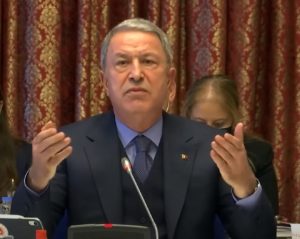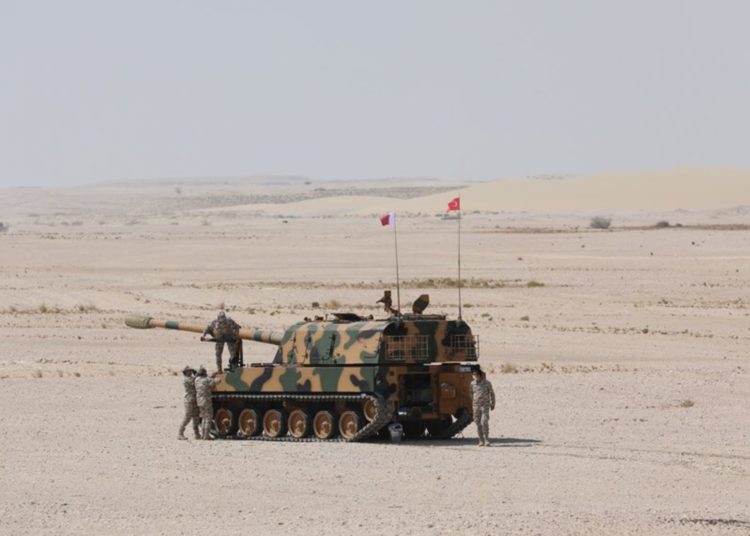Abdullah Bozkurt/Stockholm
In addition to growing restrictions and embargoes on military and defense components imported by Turkey, the Islamist regime of President Recep Tayyip Erdoğan also faces undeclared sanctions on the transfer of dual use items that have both civilian and military applications.
The damning revelations of the embargo on imports of dual use goods were officially made for the first time at a parliamentary hearing by Turkish Defense Minister Hulusi Akar, who had come under growing scrutiny by opposition lawmakers.
The minutes of the hearing, obtained by Nordic Monitor, show that Akar vented his frustration when he was peppered with questions that challenged the government storyline about relying on the domestic defense industry for military needs.
“We are really faced with undeclared embargoes. We can’t get the desired response even from some of our allies, not only in these military matters, in the defense industry, but also in other civil production matters on the grounds that they can be used in any way for this or that purpose,” he said.
Minutes of the parliamentary hearing during which Defense Minister Hulusi Akar was questioned:
Akar said the military was doing its best to overcome the shortcomings in its needs but made clear that Turkey’s allies were systematically applying sanctions on both military and civilian dual use components.
The undeclared embargo on multiple use items shows the growing isolation of Turkey, especially among NATO allies, in response to Turkey’s military adventurism in cross-border operations that have extended from Libya to the Caucasus and from Syria to the eastern Mediterranean.
The restrictions and in some cases the ban on the sale of military and defense articles to Turkey were imposed by major NATO allies. The US sanctioned Turkey over the purchase of Russian S-400 long range missiles, a deal worth $2.5 billion, while Canada and Germany imposed bans on the export of critical components used to manufacture armed drones and artillery cannons in Turkey.
Turkey was also expelled from F35 Joint Strike Fighter program, with the US canceling the delivery of pre-ordered jets. According to Akar, the expulsion will cost Turkey $11 billion in export revenue as some of the components for the F-35s will be no longer manufactured in Turkey. He said talks with US officials on recouping the $1.4 billon Turkey paid for the purchase of F35s were still ongoing. A US delegation came to Turkey on October 27 to sort out the financial problems, and another meeting is scheduled to be held in the US in early 2022, according to the defense minister.

In April 2021 the US started implementing sanctions on the Presidency of the Defense Industry (Savunma Sanayii Baskanligi, SSB), Turkey’s top defense procurement agency, along with its chief and three other senior officials working within it. The sanctions include a ban on all US export licenses and authorizations to the country’s SSB as well as asset freezes and visa restrictions on the four SSB officials as punishment for Ankara’s purchase of the Russian-made missile defense system.
Canada suspended in 2020 and later blocked military arms exports to Turkey after a probe found Canadian drone technology had been misdirected for use in conflicts. Turkish defense technology company Baykar, which is owned by President Erdogan’s son-in-law, has sold its Bayraktar TB2 armed drones to Azerbaijan, Ukraine, Qatar and Libya.
Not only NATO members but also the European Union has started to rely on sanctions with respect to Turkey, a candidate country for admission to the bloc. In a new report issued in October 2021 by the European Commission, Turkey was criticized for foreign and security policy choices that often contradicted those of the 27 EU member states, while the government of President Erdoğan was taken to task for deploying Syrian fighters in Libya and arming rebels in Syria in coordination with the Turkish army.
“There was backsliding in the framework of political dialogue on Common Foreign and Security Policy (CFSP) as Turkey’s increasingly assertive foreign policy continued to collide with the EU priorities under CFSP, notably due to its support for military actions in the Caucasus, Syria and Iraq,” said the report.
Akar confirmed Germany’s arms embargo on Turkey:
Turkey’s military involvement in Libya, especially sending Syrian fighters there, seriously hampered the implementation of the UN-led Berlin process. “Turkey claimed that the UN embargo provisions, the articles on withdrawal of foreign elements and the suspension of military training in the cease-fire agreement are not applicable to the legitimate government,” the report stated, stressing that “the presence of mercenary forces was a complicating factor.”
The EU also found that Turkey’s position on Operation IRINI was not justified. The EU’s Operation IRINI is tasked with enforcing a UN arms embargo on Libya in the high seas under UNSC resolutions adopted in 2016 and 2020 and has been operative since March 31, 2020. Turkey claimed Operation IRINI was not balanced and that it disproportionally targeted the Turkish-backed Government of National Accord (GNA).
The divergence over IRINI led to increased tension between Turkey and the EU and to maritime incidents as EU member states tried to enforce the UN arms embargo on Libya. As part of the IRINI operation, a German naval vessel intercepted the Turkish-flagged cargo ship M/V Roseline A in the Mediterranean, roughly 200 kilometers off the coast of Libya, on November 22, 2020 on suspicion that the vessel was carrying illegal arms. The interception sparked a strong reaction from the Erdoğan government, which claimed that the EU had no authority to inspect Turkish ships.
In the parliamentary hearing, Akar mentioned Germany as the country that blocked the sale of engines for the locally produced 155mm self-propelled artillery howitzer called Fırtına (Storm). “Germany changed its mind and would not provide it [the engine]. We are struggling to procure a replacement,” Akar said, asking the opposition to share their ideas on how to overcome such an obstacle. “We are all in the same boat,” the defense minister noted, claiming that efforts to manufacture engines locally are underway.
The Turkish land forces rely heavily on Fırtına artillery in cross-border operations, especially in Syria, to provide cover for its troops and suppress enemy fire. Turkey also wanted to export them to other countries but was blocked by Germany, which holds the license for the engines. According to Akar, only six Fırtına were manufactured in Turkey in 2021.












